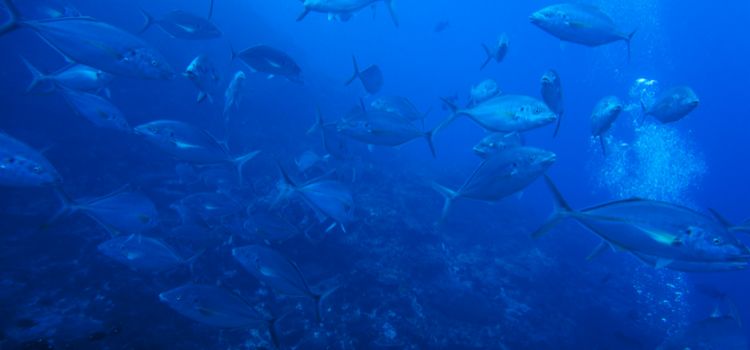As hurricanes barrel through the ocean, they have a profound impact on the marine life beneath the waves. Fish are an essential component of the ocean’s ecosystem, and they play a vital role in maintaining the balance of the underwater world. Hurricanes, however, can wreak havoc on the lives of fish, causing widespread damage to their habitats and disrupting their natural behaviors.
Contents
During a hurricane, the strong winds and heavy rains can create significant changes in the ocean’s environment. The powerful winds can stir up the water, creating large waves and strong currents that can make it difficult for fish to swim or find food. The heavy rainfall can also lead to freshwater runoff, which can lower the salinity levels in the water and create unfavorable conditions for certain species of fish.
Despite the challenges hurricanes pose to fish, many species have evolved to adapt to these extreme weather conditions. Some fish, for example, may seek shelter in the deeper parts of the ocean or swim to areas where the water is calmer. Others may change their feeding patterns or migrate to different locations in search of food. Understanding how fish respond to hurricanes is crucial for scientists and policymakers who are working to protect and conserve marine life in the face of climate change and other environmental threats.
The Impact of Hurricanes on Fish
During a hurricane, fish, sharks, and other marine life face a variety of challenges that can impact their survival. Understanding these challenges is essential for predicting the effects of hurricanes on fish populations and developing strategies for managing them.
Changes in Water Temperature
One of the most significant impacts of hurricanes on fish is changes in water temperature. Hurricanes can cause rapid and dramatic changes in water temperature, which can be deadly for fish. For example, if the water temperature drops too quickly, fish may become lethargic and unable to swim, making them vulnerable to predators. On the other hand, if the water temperature rises too quickly, fish may become stressed and experience oxygen depletion, which can lead to death.
Changes in Salinity
Another impact of hurricanes on fish is changes in salinity. Hurricanes can cause large amounts of freshwater to enter coastal waters, which can dilute the saltwater and create a hypotonic environment. This can be particularly problematic for fish that are adapted to living in saltwater, as they may struggle to maintain their internal salt balance. Additionally, changes in salinity can impact the availability of food sources for fish, which can further impact their survival.
Changes in Oxygen Levels
Hurricanes can also impact fish by causing changes in oxygen levels. During a hurricane, strong winds and waves can mix the water column and increase the amount of oxygen available to fish. However, if the storm is severe enough, it can cause oxygen depletion in the water, which can be lethal for fish. Additionally, changes in water temperature and salinity can impact the solubility of oxygen in the water, further impacting fish survival.
Behavioral Changes in Fish During a Hurricane
Migration
During a hurricane, fish may migrate to deeper waters in order to avoid the rough surface conditions. Strong winds and heavy rain can cause surface waters to become turbulent and disorienting for fish, making it difficult for them to navigate. Some fish may also migrate to areas with lower salinity levels, as hurricanes can cause freshwater runoff into the ocean.
Hiding and Sheltering
Fish may also seek shelter during a hurricane. They may hide in crevices, under rocks, or in other areas where they can avoid the strong currents and waves. Larger fish may also seek refuge near underwater structures such as reefs or shipwrecks. Some fish may even bury themselves in the sand to avoid the disturbance caused by the hurricane.
Feeding and Hunting
During a hurricane, fish may experience changes in their feeding and hunting behaviors. The turbulent waters can stir up sediment and debris, making it difficult for fish to locate their prey. However, some fish may take advantage of the situation by feeding on smaller fish that are disoriented by the rough conditions. Additionally, hurricanes can cause an influx of nutrients into the water, which can lead to an increase in plankton and other small organisms that fish feed on. In summary, during a hurricane, fish may migrate to deeper waters, seek shelter, and experience changes in their feeding and hunting behaviors. By adapting to these changing conditions, fish are able to survive and thrive in the face of one of nature’s most powerful forces.
The Aftermath of a Hurricane
Fish Kills
Unfortunately, hurricanes can cause significant damage to aquatic life, including fish. During a hurricane, strong winds and heavy rainfall can cause flooding and erosion, which can lead to a decrease in oxygen levels in the water. This can cause fish to suffocate and die.
In addition, hurricanes can also cause pollution, as debris and chemicals are washed into the water. This can further harm fish and other aquatic life, leading to fish kills.
After a hurricane, it is common to see large numbers of dead fish floating in the water or washed up on shore. This can be devastating for local ecosystems and the fishing industry.
Related – is fishing good after a hurricane?
Ecological Recovery
Despite the initial damage caused by hurricanes, many ecosystems are able to recover over time. Fish populations can rebound, and the environment can return to a healthy state.
However, this recovery can take years or even decades. In the meantime, it is important for humans to take steps to help the environment recover. This may include reducing pollution, restoring natural habitats, and implementing sustainable fishing practices.
By working together, humans and the environment can recover from the devastating effects of a hurricane.

